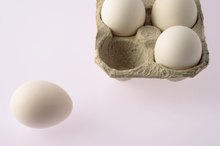How Many Calories Should a 135-pound Woman Intake Each Day to Stay That Weight?
Many women weighing 135 pounds are at a healthy weight. Exceptions are short-statured women who are 5-foot-1 or shorter, because when they weigh 135 pounds their body mass index falls into the overweight category, according to the National Heart, Lung and Blood Institute. The number of calories a 135-pound woman requires to maintain her current weight is based on her activity level.
Sedentary Women
Women weighing 135 pounds who are sedentary – that is, they avoid regular physical activity – need about 13 calories for each pound of their body weight to maintain their weight, according to Harvard Medical School. Therefore, sedentary 135-pound women require about 1,755 calories daily to stay at their current weight. However, individualized calorie needs vary by age. Women’s calorie requirements for weight maintenance decrease at age 26 and again at age 51, according to the Dietary Guidelines for Americans 2010.
- Women weighing 135 pounds who are sedentary – that is, they avoid regular physical activity – need about 13 calories for each pound of their body weight to maintain their weight, according to Harvard Medical School.
Moderately Active
Recommended Daily Allowance for Calories
Learn More
Moderately active 135-pound women need 15 to 16 calories for each pound of their body weight daily to maintain their current weight. The University of Washington suggests moderately active women aim for 15 calories per pound, and Harvard Medical School reports moderately active females need 16 calories for each pound of their body weight daily. Therefore, 135-pound moderately active women seeking weight maintenance should shoot for 2,025 to 2,160 calories a day.
Regular Physical Activity
Active women not only expend more calories during exercise, they generally have more muscle mass – which boosts metabolism throughout the entire day. Women who regularly participate in strenuous exercise need about 18 calories per pound of their body weights on a daily basis, suggest Harvard Medical School and the University of Washington. Based on these recommendations, 135-pound active females require about 2,430 calories daily to maintain their current weight.
Athletes
Recommended Amount of Calories to Be Burned Each Day
Learn More
Because women athletes often engage in intense physical training at high intensities for long periods of time, their calorie needs generally exceed those of non-athletes. According to the University of Missouri Extension, female athletes generally require 20 to 23 calories per pound of their body weights on a daily basis. Therefore, a 135-pound female athlete might need 2,700 to 3,105 calories a day to maintain her current body weight.
Related Articles
References
- National Heart, Lung and Blood Institute: Body Mass Index Table 1
- University of Washington: Weight Management
- Harvard Medical School: Good Nutrition: Should Guidelines Differ for Men and Women?
- U.S. Department of Agriculture, U.S. Department of Health and Human Services: Dietary Guidelines for Americans 2010
- University of Missouri Extension: Female Calorie Needs
- A new predictive equation for resting energy expenditure in healthy individuals - PubMed
- Estimation of energy expenditure using prediction equations in overweight and obese adults: a systematic review - PubMed
- Validity of predictive equations to estimate RMR in females with varying BMI - PubMed
- Appendix 2. Estimated Calorie Needs per Day, by Age, Sex, and Physical Activity Level - 2015-2020 Dietary Guidelines | health.gov
- Protein intake and energy balance - PubMed
- Increased Dietary Protein as a Dietary Strategy to Prevent and/or Treat Obesity
- Effect of protein overfeeding on energy expenditure measured in a metabolic chamber - PubMed
- Dietary Protein and Energy Balance in Relation to Obesity and Co-morbidities - PubMed
- Effect of protein overfeeding on energy expenditure measured in a metabolic chamber - PubMed
- Presence or absence of carbohydrates and the proportion of fat in a high-protein diet affect appetite suppression but not energy expenditure in normal-weight human subjects fed in energy balance - PubMed
- Gluconeogenesis and energy expenditure after a high-protein, carbohydrate-free diet - PubMed
- A high-protein diet for reducing body fat: mechanisms and possible caveats
- A high-protein diet induces sustained reductions in appetite, ad libitum caloric intake, and body weight despite compensatory changes in diurnal plasma leptin and ghrelin concentrations - PubMed
- The effects of consuming frequent, higher protein meals on appetite and satiety during weight loss in overweight/obese men - PubMed
- Dietary Strategies for Weight Loss Maintenance - PubMed
- Dietary protein - its role in satiety, energetics, weight loss and health - PubMed
- High Compared with Moderate Protein Intake Reduces Adaptive Thermogenesis and Induces a Negative Energy Balance during Long-term Weight-Loss Maintenance in Participants with Prediabetes in the Postobese State: A PREVIEW Study - PubMed
- Effects of food form and timing of ingestion on appetite and energy intake in lean young adults and in young adults with obesity - PubMed
- Effects of fruit and vegetable, consumed in solid vs beverage forms, on acute and chronic appetitive responses in lean and obese adults - PubMed
- Sugar-sweetened beverages and weight gain in children and adults: a systematic review and meta-analysis - PubMed
- Resolved: there is sufficient scientific evidence that decreasing sugar-sweetened beverage consumption will reduce the prevalence of obesity and obesity-related diseases - PubMed
- Adverse metabolic effects of dietary fructose: results from the recent epidemiological, clinical, and mechanistic studies - PubMed
- Water-induced thermogenesis - PubMed
- Water drinking induces thermogenesis through osmosensitive mechanisms - PubMed
- Water-induced thermogenesis and fat oxidation: a reassessment - PubMed
- Immediate pre-meal water ingestion decreases voluntary food intake in lean young males - PubMed
- Water consumption increases weight loss during a hypocaloric diet intervention in middle-aged and older adults - PubMed
- Tea catechin and caffeine activate brown adipose tissue and increase cold-induced thermogenic capacity in humans - PubMed
- Caffeine enhances activity thermogenesis and energy expenditure in rats - PubMed
- The effects of caffeine intake on weight loss: a systematic review and dos-response meta-analysis of randomized controlled trials - PubMed
- Caffeine intake is related to successful weight loss maintenance - PubMed
- Preserving Healthy Muscle during Weight Loss
- Exercise acts as a drug; the pharmacological benefits of exercise - PubMed
- The essential role of exercise in the management of type 2 diabetes - PubMed
- A Systematic Review of Exercise Systematic Reviews in the Cancer Literature (2005-2017) - PubMed
- Benefits of exercise training on cardiovascular dysfunction: molecular and integrative - PubMed
- Exercise in the treatment of clinical anxiety in general practice - a systematic review and meta-analysis - PubMed
- The effects of a low-carbohydrate diet on appetite: A randomized controlled trial - PubMed
- Effects of low-carbohydrate and low-fat diets: a randomized trial - PubMed
- Effects of low-carbohydrate and low-fat diets: a randomized trial - PubMed
- Dietary Intervention for Overweight and Obese Adults: Comparison of Low-Carbohydrate and Low-Fat Diets. A Meta-Analysis - PubMed
- The Effects of a Low-Carbohydrate Diet vs. a Low-Fat Diet on Novel Cardiovascular Risk Factors: A Randomized Controlled Trial
- The Effect of Low-Carbohydrate Diet on Glycemic Control in Patients with Type 2 Diabetes Mellitus - PubMed
Writer Bio
Erin Coleman is a registered and licensed dietitian. She also holds a Bachelor of Science in dietetics and has extensive experience working as a health writer and health educator. Her articles are published on various health, nutrition and fitness websites.









